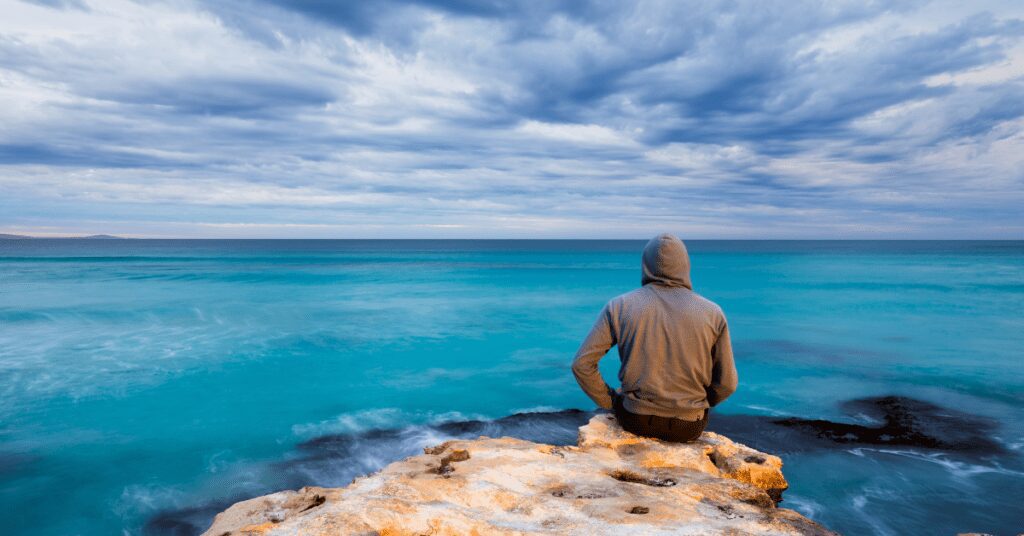By Rev. Allen Ewing-Merrill
I grew up in a small town on the coast of Maine. Every day, on my way to school or to the park or to church or to a friend’s house—anywhere my family and I would go—we’d pass along a stretch of Route 1 that skirted the rocky coastline at the edge of Penobscot Bay, where the ocean stretches out as far as the eye can see. It was always there: the blue of water blending with the blue of sky, and on a clear day, little islands dotting the horizon. This postcard-perfect tableau was so familiar, such a part of my psyche, that days and days would go by when I wouldn’t even glance in that direction. It was so ever-present, so constant, so reliable, I took it for granted. Now when I go back, I’m stunned at the beauty of my childhood home, and I think, “How did I miss this?”
How often we take the gift of God’s creation for granted—and not just its beauty and grandeur—also our dependence on it for all of life: for the air we breathe, and the miracle that our respiration happens continuously without much of any forethought or effort; for the water that sustains life, that nourishes crops, that carries nutrients to every cell in our bodies; for the soil that welcomes and nurtures the seed, producing the harvest that strengthens and fuels our bodies. In innumerable ways, our lives are sustained by the gifts the earth offers so freely.
In the Genesis account of creation, after creating the heavens and the earth, after separating the waters from the dry land, after creating plants and stars and every living creature, on the sixth day, God creates human beings and instructs them to “have dominion over the fish of the sea and over the birds of the air and over every living thing that moves upon the earth” (Genesis 1:28).
Too often we’ve misunderstood and misapplied that command, at least in white Western contexts. Rather than embracing God’s directive to steward the earth—to care for it, to preserve and protect it, to relate to it in ways that prioritize the common good and acknowledge our fundamental interdependence with all living things and with the earth itself—instead, without much thought, we’ve settled into resource-depleting ways of living that are dependent on pernicious cycles of domination, extraction, and consumption. We express our dominion recklessly and without regard for future generations.
The endless extraction and burning of fossil fuels, for example, has resulted in a warming planet, and the evidence, well documented and conclusive, paints a bleak and painful picture: global temperature rise, warming and acidifying oceans, melting glaciers, accelerating sea level rise, extreme weather events, out-of-control fires, receding forests, dying coral reefs, and extinction of species. Together these carry devastating consequences—for human beings and other species with whom we share this fragile planet.
Environmentalist Gus Speth has said, “I used to think that the top environmental problems were biodiversity loss, ecosystem collapse, and climate change. I thought that thirty years of good science could address these problems. I was wrong. The top environmental problems are selfishness, greed, and apathy, and to deal with these we need a cultural and spiritual transformation.” He concludes: “And we scientists don’t know how to do that.”
Cultural and spiritual transformation may not be within the purview of the scientific community. Cultural and spiritual transformation are, however, solidly within the purview of the faith community. Our Mother Earth is in distress. The causes are rooted in spiritual sickness, so the solutions must be spiritual solutions. This is a moment when we, the church, are called to rise.
The way we conceptualize this—the way we frame it within our congregations—matters. Instead of jumping quickly to the language of creation care, which elevates human beings and keeps us in the on-top position, what if we began by acknowledging the fundamental truth that creation cares for us? What if we reversed the way we think and talk about our relationship with the earth, beginning with a posture of humility and with gratitude for the mysterious and miraculous ways God has ordered God’s creation to ensure that we have all that we need to sustain life? What if all of our decisions were guided by the principle of reciprocity, gratefully acknowledging our interdependence with every living thing and with the earth itself, and gracefully embracing our responsibility to live faithfully and in right relationship with our non-human kin?
The earth, God’s gift, our planetary home, is too precious, too generous, too fragile to take for granted. In this season of resurrection and new life— and also in this moment of great concern for the sustainability of God’s Creation—how will you express gratitude, practice humility, and ground your actions in reciprocity, for the sake of the common good? How will you and your congregation rise to this occasion?
Your Turn
Discuss this article with us in the Faith+Lead learning lab.
About the Author
Rev. Allen Ewing-Merrill serves as Executive Director of The BTS Center, a private foundation in Portland, Maine. Building on the legacy of the former Bangor Theological Seminary, the Center seeks to catalyze spiritual imagination with enduring wisdom for transformative faith leadership.

